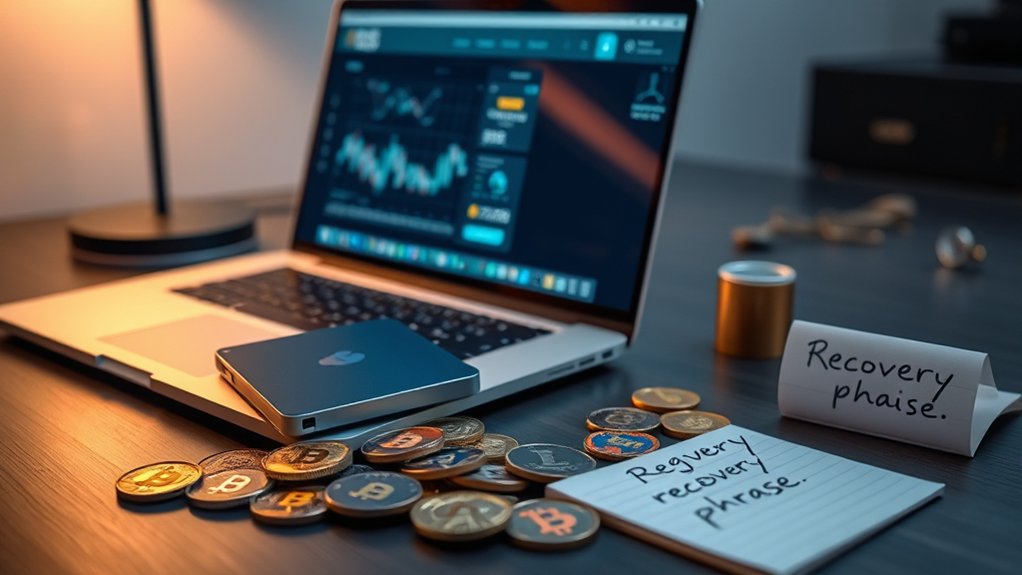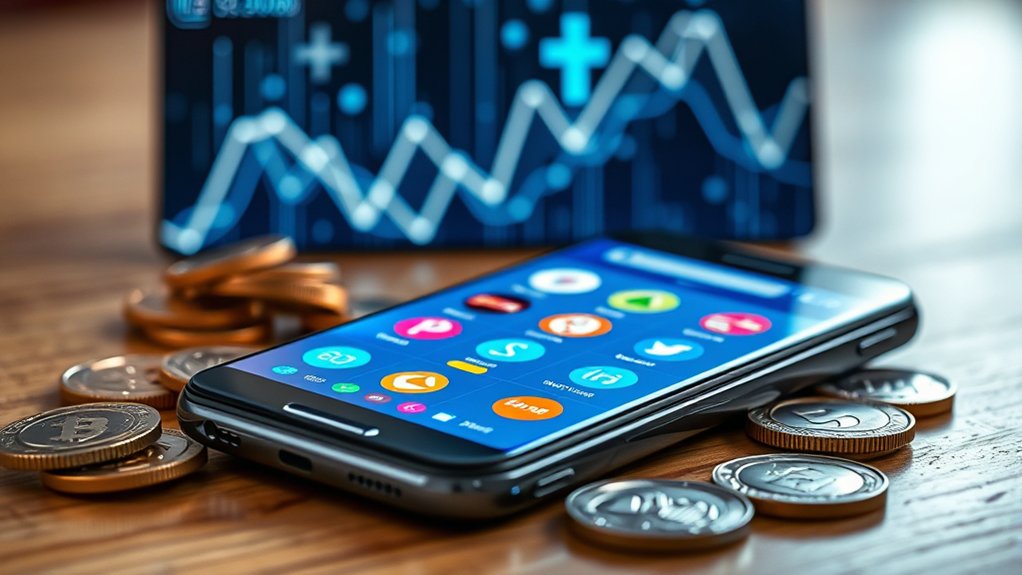Getting a crypto wallet isn’t rocket science, folks. First, pick a type: hot, cold, or custodial. Hot wallets are online and handy but watch out; they can be a security risk. Cold wallets keep your coins offline and safe. Download the software from official sites, please—no shady downloads. Set up a strong password, and create a recovery phrase. Treat it like gold before you lose access. Curious about the details? There’s more to uncover.

How does one even start to get a crypto wallet? It’s like asking how to plunge into a pool filled with money—exciting but intimidating. A crypto wallet is a program to store, send, and receive cryptocurrencies securely. Sounds simple, right? But here’s the twist: there are hot wallets, cold wallets, and custodial wallets. Each offers a different level of security.
Hot wallets are online and easy to use. Cold wallets? They’re the Fort Knox of crypto, keeping your assets offline. And custodial wallets? They’re like handing your cash to a friend—convenient but risky.
Hot wallets are user-friendly and online, while cold wallets offer top-notch security offline. Custodial wallets? They’re convenient but come with risks.
When you decide to pick a wallet, do your homework. Choose one that’s reputable and user-friendly. Download the software from the official website or app store. Avoid sketchy sites; you wouldn’t buy a car from a shady dealer, would you?
Set up your account with a password, and don’t forget that recovery phrase—12 or 24 words that are your lifeline if you lock yourself out. Secure that phrase like it’s a family heirloom. Non-custodial wallets allow you to maintain control of your private keys, which adds an extra layer of security. Understanding public and private keys is essential for managing your wallet effectively. Additionally, it’s crucial to understand the importance of keeping your private keys secure as they grant access to your funds.
Thinking of going for a hardware wallet? Buy one from a solid manufacturer. Once you’ve got the device, connect it through USB or Wi-Fi and initialize it. Don’t skip the PIN setup. It’s like putting a lock on your front door.
Now, time to fund that wallet. You can buy crypto straight from exchanges, or transfer it from your bank. Easy enough, right? Just make sure to check for deposit limits. Use the wallet address to receive your funds; it’s like giving someone your phone number.
And let’s not forget security. Regularly update your wallet software. Use strong passwords. Enable two-factor authentication. Protect your seed phrase like it’s the crown jewels.
Because let’s face it, losing access to your crypto is like losing your wallet full of cash. Not fun.
Frequently Asked Questions
What Is the Difference Between Hot and Cold Wallets?
Hot wallets are your online buddies.
They’re quick, easy to access, and great for everyday transactions.
But, oh boy, are they a hacker’s playground.
Cold wallets, on the other hand, are like that safe in your grandmother’s attic.
Super secure, but good luck getting to your crypto without some effort.
They’re ideal for long-term storage.
So, pick your poison: convenience or security?
Just remember—losing a cold wallet can feel like losing a limb.
Are Crypto Wallets Secure Against Hacking?
Crypto wallets? Secure against hacking? Well, that’s a loaded question.
Hot wallets? Basically a hacker’s playground. They’re online and vulnerable.
Cold wallets? Much safer, like a vault. But guess what? Nothing’s foolproof.
Phishing scams? They’re everywhere. If you think you’re invulnerable, think again.
Strong passwords, two-factor authentication—they help, but they’re not magic shields.
Bottom line: security is a constant battle. Stay alert, or you might just wake up to an empty wallet.
Can I Store Multiple Cryptocurrencies in One Wallet?
Absolutely, multiple cryptocurrencies can chill in one wallet.
Multi-chain wallets are the MVPs here, letting users juggle Bitcoin, Ethereum, and more—all in one place. Sounds convenient, right? No need to hop between apps like a digital nomad.
But hey, security is key. If you don’t want your assets to vanish, pick wallets with solid security features.
What Happens if I Lose My Wallet Access?
Losing access to a wallet? Ouch. That’s like tossing your life savings into a black hole.
Forget the seed phrase? Say goodbye to those funds forever.
Accidentally delete the app? Good luck getting that back.
Hardware wallet failure? You might as well have tossed it in the ocean.
And let’s not even talk about hacks. It’s a digital nightmare.
Once it’s gone, it’s really, truly gone.
Welcome to the crypto world!
Are There Fees Associated With Using a Crypto Wallet?
Yes, there are fees when using a crypto wallet. Surprise!
Most software wallets are free, but you’ll still fork over cash for blockchain network fees.
Hardware wallets? They’ll cost you upfront—think anywhere from $50 to $200.
And if you want speedy transactions? Buckle up for variable fees that skyrocket during network congestion.
It’s a wild ride, but hey, at least security features won’t cost extra—unless you count your sanity!





